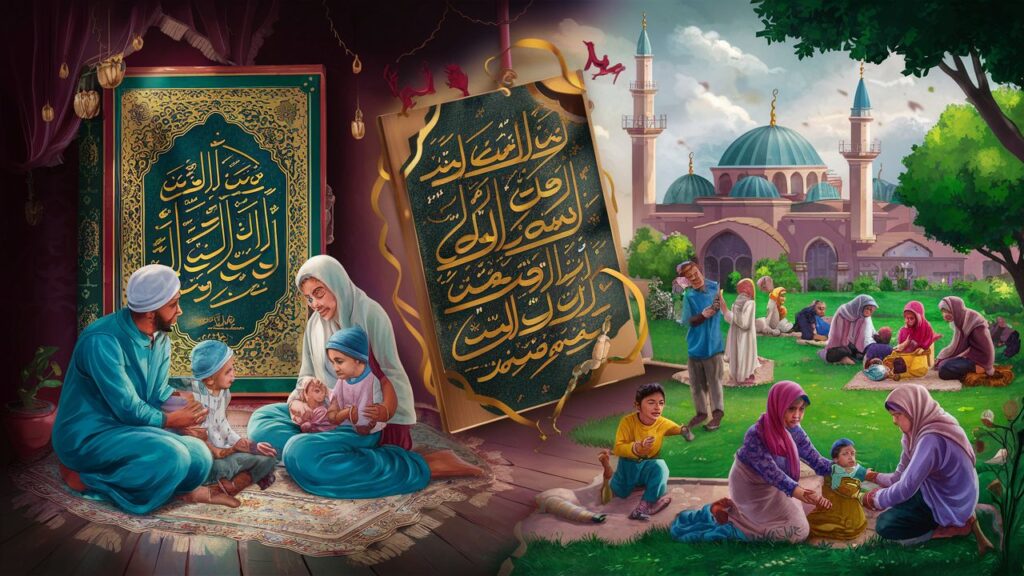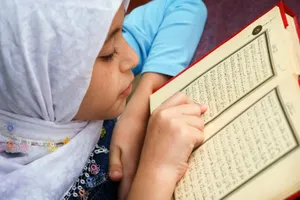Islam, the second-largest religion globally, is more than just a belief system; it’s a way of life for over a billion people. To understand Islam, one must delve into its rich history and the significance of faith in the lives of its followers.
Core Tenets of Islam

Shahada (Declaration of Faith):
- The Shahada is the fundamental creed of Islam. It consists of the simple yet profound statement: “La ilaha illallah, Muhammadur rasul Allah,” which translates to “There is no god but Allah, and Muhammad is the Messenger of Allah.”
- By reciting the Shahada, a person publicly declares their faith in the oneness of Allah (God) and acknowledges the prophethood of Muhammad.
- It serves as the cornerstone of Islamic belief, emphasizing monotheism and submission to Allah’s will.
Salah (Ritual Prayer):
- Salah, also known as Salat, is the prescribed ritual prayer performed by Muslims five times a day.
- These prayers are obligatory and serve as a direct connection between the individual and Allah.
- Muslims face the Kaaba (the sacred cube-shaped building in Mecca) during Salah, symbolizing unity and the centrality of Mecca in Islamic worship.
- Through regular Salah, believers cultivate mindfulness, seek forgiveness, and strengthen their spiritual bond with Allah.
Zakat (Almsgiving):
- Zakat is one of the Five Pillars of Islam, emphasizing charity and social responsibility.
- It involves giving a portion (usually 2.5%) of one’s accumulated wealth to those in need.
- Zakat ensures the equitable distribution of resources within the Muslim community and fosters compassion and empathy.
- By fulfilling this obligation, Muslims demonstrate their commitment to social justice and solidarity.
Sawm (Fasting during Ramadan):
- Sawm refers to fasting during the holy month of Ramadan.
- During this month, Muslims abstain from food, drink, and other physical needs from dawn (Fajr) until sunset (Maghrib).
- Fasting teaches self-discipline, empathy for the less fortunate, and gratitude for blessings.
- It also commemorates the revelation of the Quran to the Prophet Muhammad.
Hajj (Pilgrimage to Mecca):
- Hajj is the pilgrimage to the holy city of Mecca in Saudi Arabia.
- It is an obligatory religious duty for Muslims who are physically and financially able to undertake it.
- Hajj occurs during the Islamic month of Dhul-Hijjah and involves specific rituals, including circumambulating the Kaaba, standing at the plain of Arafat, and throwing pebbles at symbolic pillars.
- Hajj symbolizes unity, equality, and the universality of Islam, transcending cultural and social barriers.
Interpretations and Practices

Hadith and Sunnah
Hadith, the sayings and actions of the Prophet Muhammad, alongside the Sunnah, provide guidance for Muslims on various aspects of life, including morality, ethics, and jurisprudence.
Sharia
Sharia, Islamic law derived from the Quran and Hadith, serves as a comprehensive guide for Muslims, covering matters such as worship, marriage, finance, and governance. Its interpretation varies among Islamic scholars and communities.
Modern Challenges and Debates
Role of Women
The role of women in Islam is a subject of ongoing debate, with diverse interpretations and practices across different cultures and societies. While some argue for gender equality within an Islamic framework, others advocate for traditional gender roles based on religious teachings.
Extremism and Terrorism
Extremism and terrorism perpetrated in the name of Islam present significant challenges to the Muslim community and the world at large. Addressing root causes, promoting education, and fostering dialogue are essential in countering radical ideologies.
Islam in the Contemporary World
Islamophobia
Islamophobia, the irrational fear or prejudice against Islam and Muslims, continues to be a pressing issue globally. Combatting Islamophobia requires education, interfaith dialogue, and challenging stereotypes to promote mutual understanding and respect.
Global Muslim Population
The global Muslim population is diverse, encompassing people from various ethnicities, cultures, and backgrounds. Understanding this diversity is crucial in appreciating the richness of Islamic civilization and fostering global harmony.
Conclusion
Navigating the intricacies of Islam requires an understanding of its core tenets, diverse perspectives, and historical context. While differences may exist among Muslims, unity amidst diversity is essential for the advancement of the Islamic faith and the promotion of peace and harmony in the world. Through education, dialogue, and mutual respect, we can bridge divides and build a more inclusive society where all individuals are valued and respected.
FAQs
1. Is Islam a monolithic religion? Islam is not monolithic; it encompasses a wide range of beliefs, practices, and interpretations. While there are common core tenets, diversity within Islam is celebrated and respected.
2. What are the main differences between Sunni and Shia Islam? The main difference lies in the interpretation of leadership and succession after the Prophet Muhammad. Sunnis follow the consensus of the community, while Shias believe in the leadership of the Imams.
3. How do Muslims interpret Sharia in modern times? Muslims interpret Sharia differently based on cultural, historical, and geographical contexts. While some adhere strictly to traditional interpretations, others advocate for a more flexible approach compatible with contemporary values.
4. How does Islam promote social justice and equality? Islam promotes social justice and equality through principles such as charity, compassion, and accountability. Concepts like Zakat and Sawm emphasize the importance of caring for the less fortunate and fostering solidarity within the community.
5. How can non-Muslims support understanding and tolerance towards Islam? Non-Muslims can support understanding and tolerance towards Islam by educating themselves about the religion, engaging in respectful dialogue with Muslims, and challenging stereotypes and misconceptions. Building bridges of empathy and empathy is key to fostering mutual respect and coexistence.


